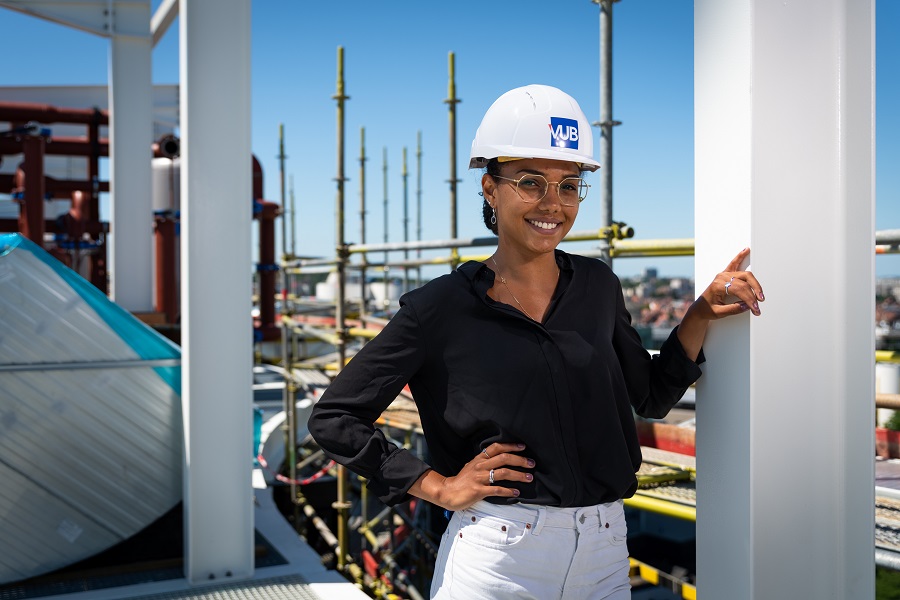Karoline da Silva Rodrigues (°1993) has been working on her History doctorate since December 2021. Thanks to her Brazilian roots, she has a broad perspective, which is helpful in investigating the situation of labourers in the Brussels building industry between 1695 and 1970. She hopes to reveal learnings that are useful today in dealing with inequality on the employment market. With this doctorate she is enriching not only her academic skills, but also her personal development: “I can already see a difference between the Karoline da Silva Rodrigues from the master’s and Karoline da Silva Rodriguez the doctoral student.”
Photos: VUB / Thierry Geenen
Karoline da Silva Rodrigues achieved her history bachelor in Brazil, as her home country. Then she travelled to Belgium, became fluent in Dutch in just a matter of months, and completed her master’s in History at VUB. She has been working on her doctorate since December 2021. Under the guidance of Prof. Dr. Wouter Ryckbosch, postdoctoral researcher Heidi Deneweth (history) and Prof. Dr. David Bassens (geography), she is studying the organisation of the labour market with the focus on the Brussels construction sector between 1695 and 1970.
Karoline: “In the labour market there are people with fixed contracts and well-paid jobs as well as people with unstable working conditions. The way in which the labour relations are arranged play an important role in the (re)production of both spatial and socioeconomic inequalities. The aim of my research is, therefore, to study the organisation of the labour market in the long run. The construction industry is an interesting case since this sector is well known for its inconsistency in demand. Therefore, it is possible to observe both inequality and opportunities for integration. Was the building industry a motor for social inclusion?”
“I’m very interested in contemporary topics, such as inclusivity. That’s why I’m keen to investigate how this was approached in different periods and have a better understanding of the relationship between social inequality and urban processes. Later, I wish to pass on this knowledge and, for example, help politicians in dealing with inequality in the labour market.”
"I wish to pass on this knowledge and, for example, help politicians in dealing with inequality in the labour market." - Karoline da Silva Rodrigues
International aspect
“VUB was already running an interdisciplinary project on the Brussels construction industry, which included investigating the issues of social inequality. At the time, I applied for this research because I already had a sense of such issues, with my experience in the Brazilian context and later during my master’s thesis in Belgium on women’s rights and policy making. In fact, that international aspect was a bonus. It gave me a wider perspective as a researcher”, adds Karoline.
Continue reading below the picture.
 Karoline Da Silva Rodrigues on the construction site of VUB's Learning and Innovation Centre. Photo: VUB/Thierry Geenen.
Karoline Da Silva Rodrigues on the construction site of VUB's Learning and Innovation Centre. Photo: VUB/Thierry Geenen.
She was not afraid of embarking on a doctorate. “I already had two friends here who were busy with research. I followed the same path and knew what to expect.”
Karoline: “It’s also really important to enjoy your research. After all, it’s your own choice to do it. You shouldn’t feel like it’s something that you’re obliged to do. Instead, you're allowed to do it. That doesn’t always make life easy. There are times when you think ‘it doesn’t work’, but in the end you realise ‘actually, it does’. I also advise doctoral students not to compare themselves with other Ph.D. candidates. We work on different subjects, follow different paths, at a different tempo and our time is allocated differently. And don’t forget: if you need help, just ask. I’m also lucky that my promoters are easily accessible and care about research.”
Already an advantage
There is certainly an advantage to doing a doctorate. “I’m still at the beginning of my Ph.D. and I’m already witnessing a difference between Karoline from the master’s and Karoline, the doctoral student. My presentation skills have improved significantly, along with my networking and research abilities. I’ve become much better at collecting data and handling complex subjects.”
"My presentation skills have improved significantly, along with my networking and research abilities." - Karoline da Silva Rodrigues
Her future? “That remains open, although I’ve always seen myself in a classroom, as I enjoy sharing my knowledge, learning from others and doing research, of course. That was already the case when I was a kid, taking care of my younger brother, playing “teacher and student”. So, I’d like to stay close to the academic world, although I’m open to opportunities in the field of policy making.”